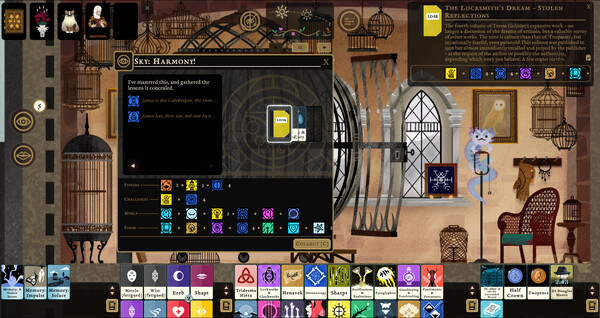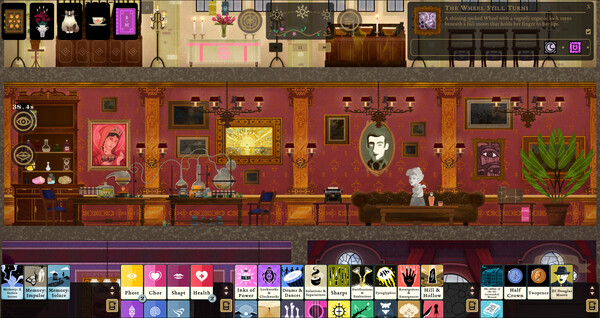Book of Hours is an exploration puzzle game about uncovering eldritch truth while sitting in a comfy chair by the fireplace. It is a relaxed version of Cultist Simulator, in which you don't have to be afraid of dying every 5 minutes and you actually keep the books you read. In fact, changes from CS to BoH is similar to how Sunless Sea transitioned to Sunless Sky. The game has way less RNG and grind than before, richer visually and gives more freedom to do what you want. It is still about managing timers and cooldowns, but there're a lot more sure ways to get the stuff you need. Closer to the endgame it may seem that your progression is throttled by RNG, but actually it is a mind trap created by relying on familiar methods. Now, the large portion of actually playing Book of Hours is figuring out what you can do and how, so telling about it in the review would defeat the whole point. This is why the review below may look like baby's first SCP article. Basic Concepts Every item in the game has stats and qualities assigned to them, allowing them to be used in certain context. Your soul cards represent both your stats, action points and what kind of approach you take when interacting with objects. On a basic level you interact with things through actions like "consider" and "speak". You can't speak to a book, but you can speak to someone about the book. Later you can find a variety of workstations that can be used in place of actions with greater efficiency at the cost of adding limitations. A surgeon's table isn't exactly a place to read a book, but can be used to dissect something. Musical instruments can create music, kitchen is a good place for cooking, etc. Reading Books You play as a newly appointed Librarian of the Hush House, an ancient repository of secret knowledge. Naturally, it is your job to know what all of the books in your possession are about. Reading books also allows you to do stuff described in them. Each book has a stat requirement that you need to match to understand its mystery. You do so by using your soul cards that match the stat. Successfully understanding the mystery rewards you with a memory, a fleeting crafting material that expires after a day. You can read the same book again to recall that memory. You also receive a lesson, a special kind of memory that you can keep for a long time, but can't recover on a second read. Lessons unlock and upgrade skills that can be used later for a variety of things. Some books also have additional qualities, like languages and curses. Librarian already knows languages like Latin and Greek, but some need to be learned from visitors. You don't have to remove a curse in order to read the book, but it is a good idea to do so. Personally, i would also recommend keeping notes about the stuff you read and what you get from each book. The game allows you to copy the text in any window by simply clicking it, so you could paste it somewhere else. Restoring the House The Hush House was abandoned for a long time. It is your job to restore it, which will take a bit more effort than just changing a few planks and repainting the walls. The Hush House was a lot of things in the past, not just a library for occult books. So restoring it is more like restoring an old SCP site, except you don't personally fight the monsters. To deal with all of the living mists, whispering shadows, sentient rays of light and other things you need assistance from nearby town. Like with books, each room requires you to match at least one stat needed to restore it. Whatever unfortunate soul you brought into the House has basic stats that you can enhance by talking to them. Use your soul to collaborate, complain about the weather or something you've read in the book, feed them, get them drunk, give them "instruments", and then send the poor fools to fight stains of screaming paint in the attic. After they are done, you permanently unlock the new room. As i mentioned before, restoring rooms deeper into the House becomes more challenging and requires higher stats to do each time. The town has a few permanent residents with low stats and a few more that come and go with seasons. Getting assistants with highest stats is tied to RNG. Additionally, the best memory you can get in early and mid game is also tied to RNG and the season. This means that unlocking rooms will require you to have: [*]the right RNG based season and weather; [*]the right RNG based assistant; [*]the right soul card available; [*]the right instrument; [*]the right drinks and food. All just to have a chance to unlock a SINGLE room. This was greatly improved after launch and with DLC, but it is still very easy to feel throttled by RNG. This issue is also compounded by how you increase your stats. Enriching the Soul Learning skills from books allows you to interact with the Tree of Wisdom. Assigning a learned skill to one of its branches gives you an additional soul card, depending on the discipline you chose and the skill. With more soul cards you can do more stuff per day. Later you can also evolve cards, trading quantity of cards for quality. Unfortunately, Tree of Wisdom is another pitfall that newer players fall into. See, evolving cards requires special workstations that only accept cards with certain stats. Which means that if you assigned a skill to a soul card that cannot be put together into a workstation, you've left yourself at a noticable disadvantage. It is not the end of the game, but it cannot be undone until a new run is started. Crafting Learning and upgrading skills and increasing your stats isn't just for reading. Many rooms in the House have special workstations that can be used to create stuff to help you with your duties. Each skill has a few recipes that require certain stats and materials. Knowledge of herbs allows you to make simple healing balms, ink brewing is used for mixing paints and inks. Higher recipes for metallurgy allow you to turn common metals into magic metals. Fleeting memories are transformed into stronger persistent memories, both of which can then be used for other things. Remember how you had to wait for the right weather to unlock a new room? Now you can just "recall" a forbidden secret and share it with your assistant. A crappy +1 to a stat from a saw? How about a creepy doll that gives +6? Have you tried my homebrew yet? It is made with wet dreams i've got from a 19th century erotic poem. Visitors and Affairs Being a Librarian isn't just about reading books yourself. It is also about lending books to people who actually need them. Sometimes something unusual will happen in the world and people will come to you for help. Periodically the game will draw a random Affair, an event happening in the greater world. Certain visitors associated with that Affair will come to you seeking knowledge. Giving them books with the right stats will reward you with special currency of the occult society, which you can use to receive favour from other visitors, like learning a new language. While visitors can teach you a new language, you can't actually teach them. If you don't have the right book on hand, you can offer visitors to stay, provided that you have the right bed. When the Affair is finished, it is added to the Tree of Wisdom, where you can decide the outcome by inviting the right visitors again, earning additional rewards. And i ran into the limit. There're a lot of things i didn't mention, like endings and the DLC stuff, but what is here should be enough.
Expand the review






































